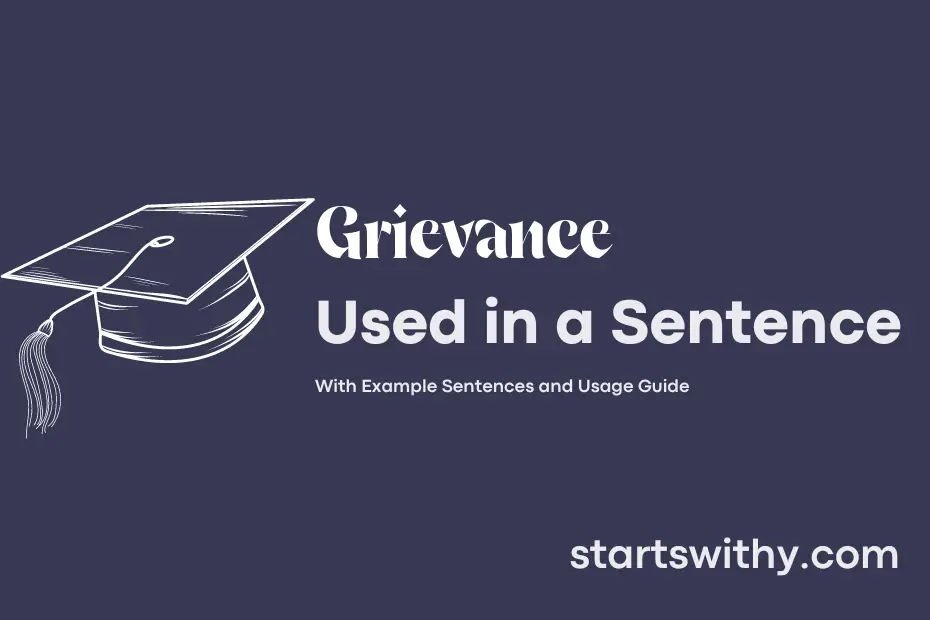Have you ever felt unjustly treated or wronged by someone? That feeling of discontent or resentment stemming from a perceived injustice is known as a grievance.
A grievance is a formal complaint or a sense of being aggrieved that is typically voiced to express dissatisfaction with a particular situation, person, or organization. It often involves a conflict or disagreement that has caused distress or unhappiness to the individual or group lodging the grievance.
7 Examples Of Grievance Used In a Sentence For Kids
- Grievance is when you feel sad or upset about something.
- It’s important to talk about your grievances with someone who can help you.
- It’s okay to have a grievance, but it’s also important to let it go.
- Sometimes, sharing your grievances can make you feel better.
- We should listen to our friends when they have a grievance.
- When you have a grievance, try to find a way to solve it peacefully.
- Taking deep breaths can help you calm down when you have a grievance.
14 Sentences with Grievance Examples
- Grievance redressal committees are set up in most Indian colleges to address student complaints.
- Submit your grievance in writing to the college administration for proper documentation.
- If you have a grievance regarding your exam results, you can request a reevaluation.
- It is important to follow the proper channels when lodging a grievance against a faculty member.
- Students can approach the ombudsman with their grievances if they are not satisfied with the college’s response.
- The college union plays a crucial role in representing student grievances and concerns to the management.
- Attending the grievance redressal meetings can help students understand the process better.
- It is advisable to keep all communication regarding your grievance professional and respectful.
- Document any evidence or supporting materials related to your grievance to strengthen your case.
- Many colleges have an online portal for students to raise and track their grievances.
- If you feel your grievance has not been resolved satisfactorily, you can escalate it to higher authorities.
- Seeking guidance from senior students who have dealt with similar grievances can be helpful.
- Stay calm and composed when discussing your grievance with the concerned authorities.
- It is important to be persistent but patient when seeking resolution for your grievance.
How To Use Grievance in Sentences?
Grievance is a term used to describe a formal complaint about something you believe is unfair or unjust. When using the word “Grievance” in a sentence, it is important to clearly communicate the issue or problem that is causing you dissatisfaction. Here is a guide on how to use Grievance in a sentence for beginners:
-
Identify the issue: Start by identifying the specific problem or injustice that you want to address. This could be related to work, school, personal relationships, or any other aspect of your life.
-
Use the word Grievance: When you express your complaint in a sentence, make sure to use the word Grievance to clearly indicate that you are raising a formal concern.
-
Provide details: To effectively communicate your Grievance, provide specific details about the situation, including what happened, why you believe it is unfair, and how it has impacted you.
Example sentence: “I submitted a formal Grievance to HR regarding the unequal treatment of employees in the department.”
- Be concise: Keep your sentence clear and concise, focusing on the key details of your Grievance without adding unnecessary information.
By following these steps, you can effectively use the word Grievance in a sentence to communicate your formal complaint or concern.
Conclusion
In summary, the examples of sentences with grievance clearly demonstrate the expression of dissatisfaction or resentment towards a particular situation, person, or system. Whether it is a formal complaint about harassment at work, a feeling of injustice in a legal proceeding, or a grievance against a neighbor for their noisy behavior, grievances are common in everyday life. These sentences serve as a way for individuals to voice their grievances and seek resolution or justice for perceived wrongs.
Overall, sentences with grievance highlight the importance of addressing and resolving conflicts and issues to improve relationships and create a more just and fair society. By effectively communicating grievances and working towards solutions, individuals can seek redress for their concerns and create a more harmonious environment for all parties involved.



